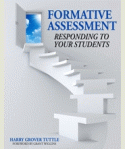People enjoy intensity such as the intensity of a ski run, an amusement ride, diving into a lake, a round of Jeopardy, or a Soduku puzzle.
Students enjoy and benefit from class when we provide them with intensity of learning We can give them short activities that are highly focused on critical learning. As we move our students from talking about learning to using what they are learning, many opportunities exist for intense learning.
In my Spanish class, I have my students do many one to two minute speaking activities. Each activity focuses on a specific language function such as asking for information or persuading. For example, in groups of two, one student looks at a picture such as a people in a mall and asks his/her partner questions while the partner answers the questions. They do not prepare for this activity, they just dive into it. They have to combine their already learned vocabulary and grammar from previous lessons to do this activity. After this intense activity, they debrief by going over what they could do better next time and then practicing to show that they can improve. This formative assessment activity provides a intense experience for students.
In my English comp0sition class, my student write essays but they write them intense part by intense part. After my students have selected a topic, narrowed it down, written a thesis, and generated ideas, they spend a few minutes in organizing the ideas into a graphic organizer. They complete the graphic organizer if any parts are missing. One student described this as putting together a giant puzzle with a clock ticking. He also commented that sometimes he has to create a missing puzzle piece. When the students finish, they feel a sense of satisfaction. A writing partner looks over their graphic organizer for the logical flow of ideas and the support of those ideas in this formative writing activity.
These intense activities require the students to use higher level thinking and to perform on the spot. Students like a challenge and that students can climb higher academically if we give them the opportunity.
How do you provide intense higher level learning for your students?
I have Spanish spontaneous speaking activities at Teacherspayteachers: http://bit.ly/tpthtuttle
My formative assessment books: http://is.gd/tbook

